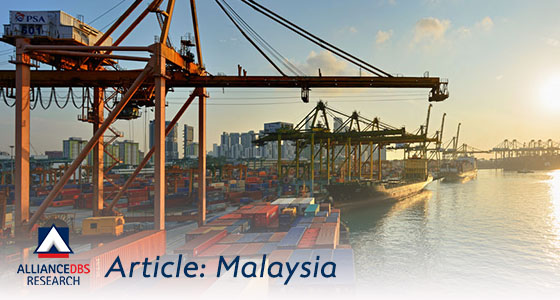Insights
Economic Focus: Moderated growth in 2Q23
21 August 2023

- 2Q23 GDP grew +2.9% y-o-y driven by resilient domestic spending despite challenging external demand.
- Domestic tailwinds from healthy private consumption supported by sustained employment strength to offset weaker external trade
- We remain cautiously optimistic of Malaysia’s prospects and maintain our 2023 GDP growth projection of 4.1% y-o-y
Normalising economic growth on high base
Malaysia’s economy grew 2.9% y-o-y and 1.5% q-o-q on a seasonally adjusted (SA) basis in 2Q23 (1Q23: +5.6% y-o-y; +0.9% SA q-o-q) – driven by steady expansion in domestic demand given the sustained labour market recovery. This takes 1H23 GDP growth to 4.2% which is within our expectation but below consensus’. For 2Q23, growth momentum has understandably moderated given the impressive recovery last year, but healthy expansion was observed in domestic demand (+4.5% y-o-y), only to be dragged by a slowdown in net exports (-3.7% y-o-y) amid a global technology downcycle.
Robust labour market
Domestic demand continues to be underpinned by sustained expansion in the labour market as unemployment rate inched lower to 3.4% in Jun 2023, adding the much-needed impetus to private consumption (+4.3% y-o-y). Real wages growth remained steady at 1% y-o-y in 2Q23 (vs 0.9% in 1Q23), indicating a largely resilient economy. Despite the relatively weaker economic growth in 2Q23, the continuous improvement in the employment market with record high labour force participation of 70% will ensure Malaysia’s 2H23 economic growth prospect remains encouraging.
Resilient domestic economy
Within the Services sector (59% of 2Q23 GDP; +4.7% y-o-y), the Wholesale & Retail Trade sub-sector grew by 4.7% y-o-y (vs 9.4% in 1Q23) while the Transportation and Storage sub-sector climbed 13% y-o-y (vs 17% in 1Q23). Apart from continued strength in household spending, continuous improvement in the tourism industry also contributed to the growth momentum in the Services sector as international passenger traffic at KLIA recovered to 70% of pre-pandemic level in 2Q23, compared to 65% in 1Q23. Meanwhile, the Construction sector is the other outperformer with a 6.2% y-o-y growth due to continued progress of large infrastructure projects.
Dampened by weak external demand
The Manufacturing sector reported a relatively flattish y-o-y growth of 0.1% in 2Q23 (vs 3.2% in 1Q23) given weaker production output from the E&E and petrochemical industries. In addition, external trade remained weak in 2Q23 amid a global slowdown affecting export-oriented enterprises, and the subdued condition is likely to persist in the near term going by the weaker-than-expected recovery in China. Nevertheless, Malaysia’s diversified export base and deep integration into global supply chain will ensure our trade resilience.
